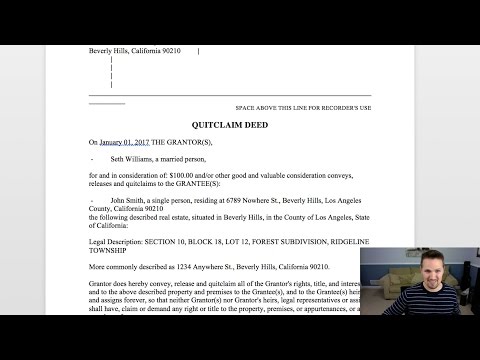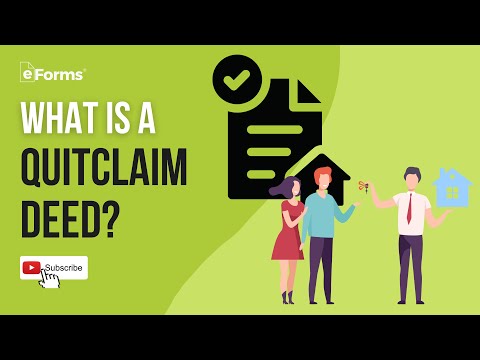Property transfers can sometimes feel like a labyrinth. However, one handy tool, often overlooked yet potent, can streamline the entire process – the Quit Claim Deed Form. Let’s roll up our sleeves and plunge into the world of such forms.
Understanding the Significance of a Quit Claim Deed Form
Now you might wonder, “What Is a quit claim deed?” Essentially, it is a document that facilitates the swift transfer of property. If used correctly, it can become a smooth shortcut through the convoluted maze of property transactions. The quit claim deed form is a formal, legally binding document wherein the owner of a property, ‘the grantor’, willingly forfeits their ownership rights to another party, ‘the grantee’. Essentially, it’s a way of saying, “If I own this, now it’s yours.”
Crucially, a quit claim deed form doesn’t guarantee the grantor’s claims over the property. It merely states that if the grantor has any rights, they are transferring them to the grantee. This differs from a “grant deed“, vital in standard sales, which warrants that the grantor has a definite interest in the property.
Although quit claim deeds might sound risky, they come with certain key advantages. They’re straightforward, cut out the noise, and create a quick pathway for ownership transfer, particularly when the grantor and grantee trust each other deeply.
However, bear in mind, every silver lining has a cloud. Some legalities and limitations are associated with quit claim deed forms. For instance, in Texas, the quitclaim deed – or deed without warranty – primarily serves to release property interest to an already listed titleholder, such as an ex-spouse post-divorce, according to the information updated on May 10, 2023. Beware though; a quitclaim deed must be notarized prior to registration. A notary’s role is ensuring signatures are valid and signatories seem to act voluntarily.

Exploring Different Types of Quit Claim Deed Forms
Quit claim deed forms aren’t one size fits all. Various forms cater to a multitude of scenarios, each with unique specifications and requirements. One such example is the quit claim deed form Florida, known for its specific demands and regulations. Hiring a real estate lawyer is highly recommended here to navigate the legal and filing requirements of both Florida and the local county recorders’ office where the property lies.
Many other state-specific quit claim deed forms, like the one in California, come with their unique regulations, which have been carefully detailed on our site’s page about the “quit claim deed California.” Dig through our resources to identify one applicable to your specific needs and location.

| Subject | Details |
|---|---|
| What is Quit Claim Deed | A legal instrument that is used to transfer interest in real property. The person who is transferring their interest is known as the Grantor. The recipient is the Grantee. |
| Common Use in Texas | Generally used to release property interests to someone already listed on the title. A common scenario is after a divorce, where one spouse releases the property to the other. |
| Role of Notarization | A Quitclaim Deed must be notarized before being recorded in the register of deeds. Notarization is critical to validate the signatures and consent of the parties. |
| Statute of Limitations | There is a four-year limit for a previous deed to be included in the chain of title and take effect after the deed is executed. |
| Importance of a Lawyer | Although it’s possible to create a quitclaim deed yourself, hiring a real estate lawyer is recommended to ensure all legal and filing requirements are met, particularly in Florida. |
| Assurance of Ownership | A quitclaim deed does not confirm that the grantor has ownership in the property; rather, it states if they do have the rights, those rights are now being transferred. |
| Typical Use Cases | Quitclaim Deeds are often used in non-sale situations, such as property transfers between family members, removing an owner from a title, or in the process of estate planning. |
Procedure Involved in Using a Quit Claim Deed Form
Let’s walk through the steps in filling and filing a quit claim deed form. Firstly, ensure the form includes the grantor’s name, grantee’s name, and the full legal property description. Signatures from all parties are essential, with a notary stamp to provide validation. The form needs to be recorded in the deeds office, hence meeting your county’s specific recording requirements is crucial.
Remember that state regulations can significantly influence the procedure. Some states, like New York, insist on the acknowledgment of the quit claim deed, while others, like California, demand a preliminary Change of Ownership Report.

Quitclaim Deed Form: Risks and Potential Consequences
The terrain of quitclaim deed forms, although beneficial, can be fraught with inherent risk. While simplicity and speed are its selling points, the lack of provided assurance can cause potential stumbles down the road. For instance, a prior deed could trickle into the chain of titles, disrupting your tranquil homeowner status, as highlighted in an update from Dec 6, 2021.
However, apprehension shouldn’t deter you from taking calculated risks. Enlist a real estate lawyer’s guidance to navigate safely through the potential pitfalls.

Real Life Use Cases of Quit Claim Deed Form
Quit claim deed forms paint a vibrant picture when applied to real life scenarios. A good example is transferring property rights in swift divorce proceedings or when parents wish to transfer property rights to their children. In such cases, a quit claim deed form, with its streamlined process, proves a valuable tool in ensuring the swift and efficient conduction of property transfers.

Future of Property Transfers: An In-Depth Look at Digitalization of Quit Claim Deed Forms
The digital whirlwind is sweeping across every corner of our lives, and property transfers aren’t immune. The rise of digital quit claim deed forms might be the answer to simplifying the complex maze of legalese and red tape surrounding property transactions. Technological advancements are making these digital forms safer, more efficient, and reliable, signaling a propitious dawn in property transfers.

Exploring Untapped Possibilities: Improving the Efficiency of Property Transfers with a Quit Claim Deed Form
In the realm of property transfers, quit claim deed forms have vast potential. Continual developments might revolutionize their efficiency and utility. Databases are progressively becoming more streamlined, and the integration of digital processes continues to facilitate increasingly more efficient property transfers.
Final Thoughts: Demystifying Complexities with a Quit Claim Deed Form
Navigating property transfers might initially appear daunting for many, akin to a chore as complex as getting that perfect “honey brown hair color“. However, an understanding of quit claim deed forms, much like learning from “Ric Flair’s daughter” about wrestling tricks, can significantly simplify the process.
The overarching goal is to empower ourselves with the knowledge – the golden road to property transactions as smooth as silk. A quit claim deed form, wielded rightly, can be your trusty companion through this journey, effectively streamlining your property transfers.
What is a quit claim deed form Texas?
Well, y’know, a quit claim deed form in Texas is almost like a magic wand! It allows an individual—call ‘em “grantors”—to transfer their property rights to another—named “grantees”—without any guarantees about the title’s history or condition. Quick and straightforward!
Does a quit claim deed need to be notarized in Texas?
In Texas, you betcha, a quit claim deed does need to nod at a notary public. Otherwise, it might have a tough time getting recognized by the county recorder’s office. So, yes – don’t neglect those notaries, folks.
How long is a quit claim deed good for in Texas?
Interestingly, a quit claim deed in Texas never actually expires. Once completed and recorded, it continues to have effect until, well, say another deed changes the property ownership somehow. It’s like the Energizer Bunny just keeps going and going!
Can I prepare my own quit claim deed in Florida?
Down in sunny Florida, sure, you can indeed whip up your own quit claim deed. But, be careful not to step on any legal landmines! If there’s any confusion, it may be worth talking to an attorney. They’ve got your back!
Can you sell property with a quit claim deed in Texas?
Can you sell a property with a quit claim deed in Texas? As sure as the sun rises! However, the buyer should mind their Ps and Qs since it doesn’t guarantee a clear title.
How do I transfer a property title to a family member in Texas?
To transfer a property title to a family member in Texas, you’re gonna play a bit of mailman – delivering a correctly filled quitclaim or warranty deed to the County Clerk’s office in the county where the property is located!
How do I remove someone from my property deed in Texas?
Removing someone from your property deed in Texas needs a quit claim deed, signed off by the person waving goodbye to their title ownership. It’s kinda like writing them out of the property’s story, legally anyhow.
Who can prepare a deed in Texas?
In Texas, the stars at night are big and bright, and anyone from attorneys to title companies, real estate agents, or private individuals can prepare a deed. A real smorgasbord of options!
Does a spouse have the right to property after signing a quit claim deed in Texas?
Despite signing a quit claim deed, yes siree, a spouse can still have a stake in a property due to Texas being a community property state. So, signing away doesn’t mean waving good riddance to all your rights!
Is a transfer on death deed legal in Texas?
In the Lone Star state, a Transfer on Death deed is indeed legal! It’s a unique way for homeowners to decide who gets their property once they ride off into the sunset.
Can you gift land in Texas?
Gifting land in Texas? Sure thing! Just like passing on an heirloom watch, all you’d need is a deed conveying the land to the lucky recipient.
How do I add my spouse to my house deed in Texas?
Adding your spouse to your house deed isn’t as hard as herding cats! Just prepare a new deed that lists both you and your spouse as the owners, then record it with a county clerk’s office.
Am I entitled to my husband’s property if he dies and my name isn’t on the deed in Florida?
Down in the Sunshine State, if your husband passes away without you on the deed, things get a bit iffy. You are entitled to a portion of the overall estate, but it’s best to consult a probate attorney.
How do I transfer property to a family member in Florida?
Transferring property to a family member in Florida is easier than whistling Dixie! It requires a completed deed, usually a gift deed or quitclaim deed, delivered to the receiver during the grantor’s lifetime.
Who can witness a quit claim deed in Florida?
In Florida, pretty much any adult can witness a quit claim deed, just as long as they aren’t a part of the transaction themselves. Kinda like an umpire in a baseball game.
Is quit claim forms legal in Texas?
Are quitclaim forms legal in Texas? Well, I’ll be – yes, they absolutely are! They legally transfer one person’s property interests to another.
How do I remove my name from a house title in Texas?
To remove your name from a house title in Texas, you’d need a bit of paperwork. The process includes signing a new deed, often a quitclaim deed, that transfers your ownership to the other party.
How do I notarize a quit claim deed in Texas?
Notarizing a quitclaim deed in Texas involves an official notary reviewing, confirming identities, and watching as you sign. It’s their job to make sure everything’s on the up and up!
Is a transfer on death deed legal in Texas?
A Transfer on Death deed in Texas is indeed a big yes! Basically, it’s like reserving a parking spot for your house once you’re no longer in the picture. It’s been legal since 2015 and has been pretty darn handy for folks ever since.



